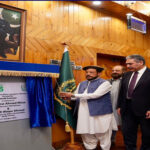[author image=”http://hunzanews.com/wp-content/uploads/2014/06/10478665_10204000260676083_2726151111927057703_n.jpg” ]Masood Ali Khan is a social activist and working in the development sector. He can be reached atmasoodalikhan88@gmail.com[/author]
By looking at the political parties and their activities in Gilgit-Baltistan, it appears that we are unable to be educated in terms of politics and lack of awareness to understand the real democracy. The people of Gilgit-Baltistan are usually motivated and influenced by certain mindsets, popularized through propaganda, manifestos, slogans and lofty mandates.
However, the ground realities have convinced me to search for and think about the political, social and economic situation of the areas ruled by politicians having their roots in the federal government.
A comparison of life then and now shows that the situation of the Gilgit-Baltistan region has changed with the passage of time. Different people have different opinions and perceptions regarding the factors of change, though. Some credit the process of change to the role of political parties, while others state other reasons, like opening of the KKH, educational revolution in the region and so on and so forth. Every individual tries to justify the changes according to their developed mindset.
In reality, the current situation is very volatile and despite of all the progress we have made, there’s a lot that needs to be achieved on almost all fronts. Real development will need real leadership and that can come only through clarity of vision, ability to elect the best candidates and playing above sectarian, regional and linguistic lines.
I usually ask myself, “What if we had the old governance system in our region, probably with new faces and ideologies, certain amendments, and a more democratic dispensation? This question arises from the benevolence, efficiency and performance of the past ruling systems of the area, especially in Hunza Valley. I have a feeling that the reformed old system could have played an important role in the development of the area; we could have had our own identity, system of governance, ownership of resources and a democratically controlled governance mechanism.
This is not to mean that we should have a separate entity. Rather, this question arises from the perpetual and unjustified uncertainty that looms over our heads for the last six decade.
Despite of all the hurdles, it was a pleasure to observe the people of Gilgit-Baltistan showing unity for some common issues recently through political alliance. If we had this level of engagement in the past, our society could have been saved from a lot of unwanted trouble.
In democracies, there’s always a day of judgment, when the rulers are held accountable and they are punished or rewarded based on their performance. The citizens of Gilgit-Baltistan are interestingly waiting for the Day of Judgment when their leaders will approach them again for votes.
I would recommend that the alliance of political parties made to overcome the issues of wheat subsidy should work with the same spirit for the whole five years ahead, considering the actual need for the development of the area in terms of education, health, economy, employability and many more. And the people of Gilgit-Baltistan should judge their past leaders fairly, to ensure that only the right persons get to the positions of power and prestige. The public waiting for the democratic Day of Judgment needs planning and proper decisions through their votes rather than decisions reflecting emotions and so called affiliations with any of the political or religious bodies.























